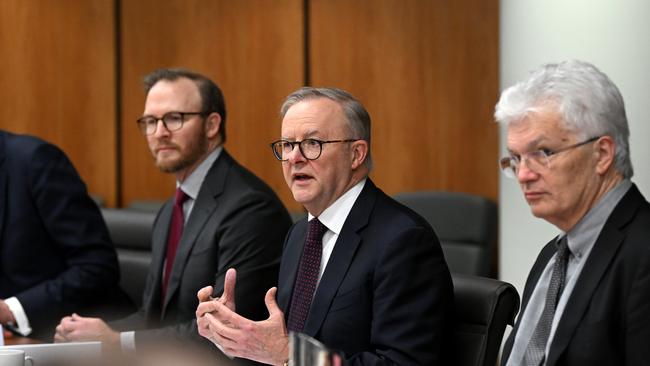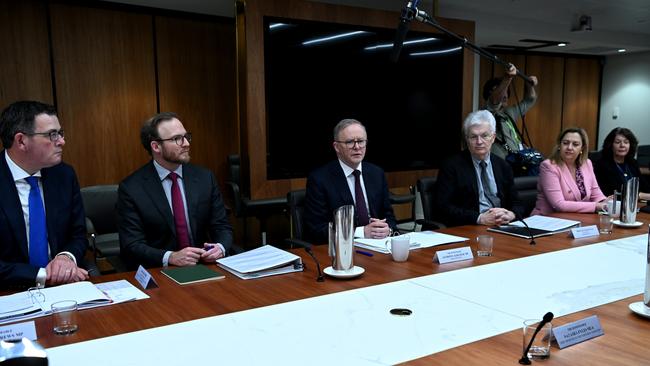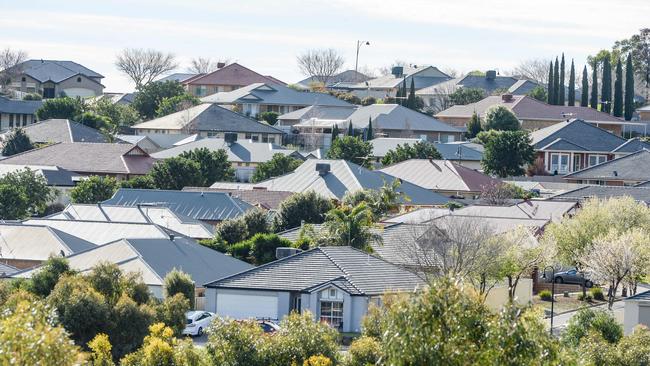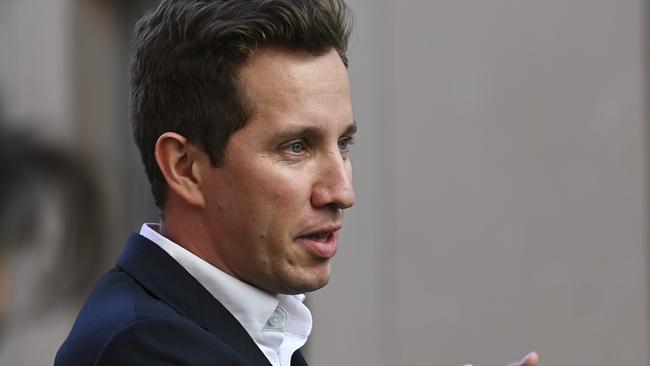National cabinet reaches deal on housing supply crisis, new rent rules as Greens fume
The Greens have accused the nation’s leaders of ‘polishing a turd’ after announcing rental reforms that the minor party claim already exist.
Leaders
Don't miss out on the headlines from Leaders. Followed categories will be added to My News.
The Greens have taken a housing supply and rental package announced by national cabinet to task, criticising the country’s first ministers for attempting to “polish a turd”.
As the country is gripped by a housing crisis, Prime Minister Anthony Albanese and the nation’s premiers and chief ministers emerged from Wednesday’s national cabinet meeting with a list of changes for renters, and a blueprint to speed up the construction of much needed affordable housing.
The Prime Minister announced an additional $3 billion sweetener for states and territories should they build more than their share of the one million well-located homes target set under the National Housing Accord.
The initiative works out to be an additional $15,000 per extra home built, which the states can use as they like.
The new funding coincides with an increase in the National Housing Accord target, which has risen by 200,000 to 1.2 million new homes over the next five years.
Mr Albanese’s new blueprint to reform national planning laws will include measures to cut red tape, fast-track property approvals, and change zoning laws.
National cabinet also agreed to a nationally consistent approach to renting, including a limit of one rent increase a year and minimal standards for renters.
“These changes will make a tangible impact for the almost one third of Australians who rent,” Mr Albanese said.
But Greens housing spokesperson Max Chandler-Mather lambasted the national cabinet for “announcing the status quo”, noting that every jurisdiction – except Northern Territory – already had a once-a-year limit.

The Greens had instead been calling on a two year freeze on rent increases, followed by a cap on yearly rent increases.
“Today the Labor Party spat in the face of nearly eight million people in this country who rent, and offered them basically nothing,” Mr Chandler-Mather said.
“They can polish a turd all they like, but no renter is going to buy this.
“...The problem is at the end of your one year lease, which most renters are on anyway, your rent is going up by an astronomical amount. For most renters, this means nothing... for everyone outside of the Northern Territory there is actually no change at all.”
Mr Chandler-Mather also hit out at the agreed upon national rental standards, saying it was “a sick, sick joke” to set hot and cold running water and a working stove as a minimum.
He said the package announced on Wednesday was not enough to sway the Greens to break the stalemate and support the government’s $10 billion Housing Australia Future Fund, which remains deadlocked in the Senate.
Asked whether he was convinced he had done enough get the Greens over the line on the vote, Mr Albanese said he hadn’t spent the day thinking about the Greens, but the announcement showed “how serious” state and territory governments across the political spectrum were taking supply issues.

“That’s the key to putting downward pressure (on rents) and assisting renters in addition to the sensible renters’ rights that we’ve agreed to,” he said.
Pressed further on whether limiting a rent increase to once a year – without setting a cap on how high that raise could be – was good enough for renters, Mr Albanese said the first ministers were united in working together for “greater national consistency” and emphasised that supply was the more pressing issue.
“But we’re not in a position to flick the switch and just change eight pieces of legislation across states and territories immediately,” he said.
“And that’s why we have that position there, which is to move towards the other measures that you’ll see in the renters rights that have been agreed to today.
“What we’re doing is moving towards greater national consistency and making a practical difference.”

Mr Chandler-Mather said the extra $3 billion announced on Wednesday would have been better served being directly tied to building more social and affordable homes.
Mr Chandler-Mather said the new money was nothing less than “cash incentive payments for property developers to build more homes”, and offered no guarantee for social and affordable housing to fund a fix to the housing crisis.

After the Greens sided with the Coalition to veto the housing bill in June, the government reintroduced the HAFF legislation into the House of Representatives in early August, and plan to return it to the upper house in October.
Mr Chandler-Mather said despite his disappointment in Wednesday’s announcement, the party was still willing to negotiate on the HAFF.
“The Bill is due back on October 16 … We certainly hope that over the weekend at Labor’s national conference, maybe the Prime Minister finally realises he needs to do more and announces something there,” he said.
“We’re going to keep pushing as hard as we can.”
If the Senate fails to pass the HAFF legislation in October, the bill may act as a trigger for a double dissolution election, sending Australians back to the polls.
Originally published as National cabinet reaches deal on housing supply crisis, new rent rules as Greens fume


